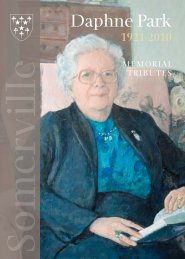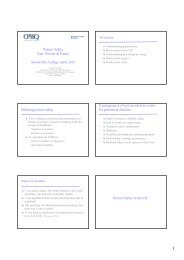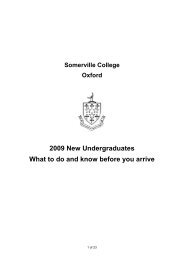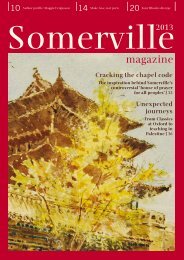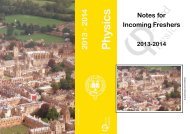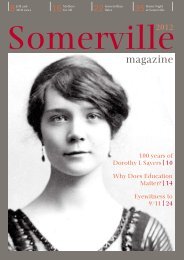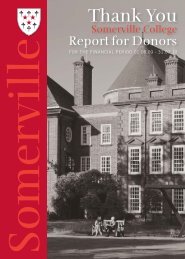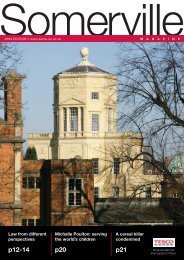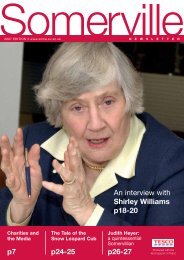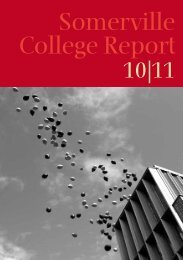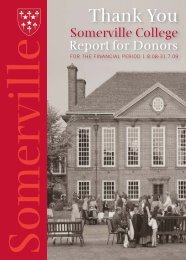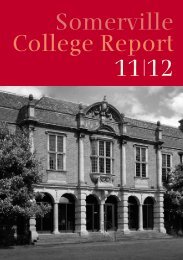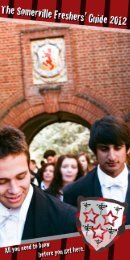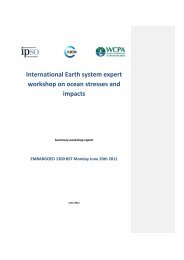magazine - Somerville College - University of Oxford
magazine - Somerville College - University of Oxford
magazine - Somerville College - University of Oxford
You also want an ePaper? Increase the reach of your titles
YUMPU automatically turns print PDFs into web optimized ePapers that Google loves.
16 | <strong>Somerville</strong> Magzine<br />
Powers <strong>of</strong> Observation<br />
SUSAN LOURENÇO<br />
(Loewenthal,<br />
1954, History)<br />
Humiliation and<br />
harrassment<br />
at the hands <strong>of</strong><br />
conscript soliders<br />
the age <strong>of</strong> our<br />
grandsons.<br />
Sunset at A Ras<br />
seen through razor wire<br />
An Israeli citizen describes her<br />
involvement in an extraordinary<br />
group <strong>of</strong> women who are upholding<br />
the human rights <strong>of</strong> Palestinians –<br />
simply by watching.<br />
Throughout my career as a university<br />
administrator, I had little time or inclination to<br />
volunteer for anything unconnected with my work,<br />
much <strong>of</strong> which dealt with social justice and outreach to<br />
Chicago’s African American and Hispanic minorities.<br />
My passion for equity and justice led me to continue<br />
the struggle for human dignity when I moved to Israel.<br />
I agreed, when approached by an Israeli NGO ‘A New<br />
Way’, to serve as their chair in bringing together Jewish<br />
and Palestinian-Israeli children in Jaffa where I live. And<br />
a member <strong>of</strong> A New Way took me the next step – to<br />
MachsomWatch.<br />
In the 1967 Six Day War, Israel occupied the West Bank<br />
and Gaza. Years went by, but voices raised in Israel and<br />
abroad against Israel’s occupation went unheeded. Jewish<br />
settlements grew like mushrooms, while international laws<br />
on the occupier’s obligations were ignored. The results<br />
were two Palestinian Intifadas – popular uprisings, the<br />
second <strong>of</strong> which began in autumn 2000. Early in 2001,<br />
a group <strong>of</strong> Israeli women began to check rumours<br />
circulating in Jerusalem about violation <strong>of</strong> human rights<br />
at newly created checkpoints around the city. They drove<br />
out to these checkpoints (machsomim), stood there,<br />
monitored and reported what they saw.<br />
Today, from these unassuming beginnings, 250 to<br />
300 Israeli women observe and report, day in day out<br />
throughout the year, in words and pictures, protesting<br />
the checkpoints, mounds and ditches that hamper daily<br />
life across the Occupied Palestinian Territories (OPT). We<br />
document conduct <strong>of</strong> the Israel Defense Forces soldiers,<br />
Border Police and Israel Police (and violence-prone<br />
settlers), protect the human rights <strong>of</strong> Palestinians and<br />
assist them wherever possible.<br />
I joined MachsomWatch five and a half years ago, after<br />
becoming an Israeli citizen. Though I had worked for civil<br />
rights in the US, I had never been involved in a conflict<br />
arena, or engaged in human rights – certainly not one as<br />
basic as freedom <strong>of</strong> movement.<br />
MachsomWatch is entirely volunteer-run, a grass roots<br />
organisation, no membership fees, no formal hierarchy.<br />
Women drive deep into the West Bank, around Jenin<br />
in the north, Hebron in the south, the cities <strong>of</strong> Qalqilya,<br />
Tulkarm and Nablus in the centre and around Jerusalem:<br />
a minimum two women to a shift, morning and afternoon,<br />
and before dawn to monitor the newly privatised access<br />
‘terminals’ to Israel proper, where thousands <strong>of</strong> Palestinian<br />
men and women lucky enough to get work permits line up<br />
at 3 am hoping to reach their jobs in Israel.<br />
A report written after each shift, in English or Hebrew,<br />
translated by volunteers into the other language, is posted<br />
on www.machsomwatch.org. We have no <strong>of</strong>fice, just an<br />
<strong>of</strong>ficial address. When MachsomWatch became a legal<br />
‘charity’, just about when I joined, I <strong>of</strong>fered to write funding<br />
proposals and liaise with embassies and foundations.<br />
When not driving to checkpoints and writing reports, I’m<br />
busy seeking funds to carry on (we spend over £90,000<br />
a year on transportation alone: some women won’t drive<br />
in the OPT, so a Palestinian Israeli driver ferries them). I<br />
drive about 130 miles a shift, once a week, in summer<br />
heat and winter rain, frequently with visitors – mostly<br />
from abroad – who invariably find it hard to digest what<br />
they see: thousands <strong>of</strong> lives disrupted by humiliation and<br />
harassment at the hands <strong>of</strong> conscript soldiers the age<br />
<strong>of</strong> our grandsons, withholding <strong>of</strong> permits (to work, trade,<br />
study, get medical treatment or attend family celebrations)<br />
– with a sickening callousness. A Palestinian friend, owner<br />
<strong>of</strong> a ‘seam line’ plant nursery between the 1949 armistice<br />
Green Line and the newly built Separation Wall (a land<br />
grab rather than a security need) told me recently that<br />
a young soldier made his 77-year-old father take <strong>of</strong>f his<br />
shoes and walk barefoot through a muddy checkpoint.<br />
Over the years, we’ve done what we can on behalf<br />
<strong>of</strong> our Palestinian friends, people met on our forays,<br />
at the checkpoints or along the way. We tried to prevent<br />
the cutting down <strong>of</strong> olive trees to build a ‘security’ road<br />
around a settlement; we’ve picked olives with a family,<br />
joined in happy events like weddings or the birth <strong>of</strong> a baby,<br />
made endless phone calls to the army and its so-called<br />
‘humanitarian centre’, <strong>of</strong>ten to no avail, but with occasional<br />
success in our attempts to ease life under occupation.<br />
The Palestinian landscape is dotted with roadblocks,<br />
apartheid roads, Separation Wall, military lookout towers,<br />
razor wire and ‘rolling’ checkpoints – a military jeep or<br />
Hummer suddenly across the middle <strong>of</strong> a road. The<br />
occupation is <strong>of</strong>ten mindless in its unpredictability.<br />
Checkpoints and barricades are put up, taken down;<br />
checkpoints are manned one day, unmanned the next.<br />
Added to this, the occupation’s bureaucracy has created<br />
a system, connected to ‘security’, overseen by the secret<br />
service which ‘blacklists’ people trying to get permits to<br />
work in Israel, to visit an ailing relative, to go to a hospital<br />
in another West Bank city, etc., who refuse to become<br />
informers. No wonder Palestinian society is disintegrating;<br />
no wonder the Palestinians are dependent on the<br />
subjugator: there is little work within the West Bank itself.<br />
In brief, much <strong>of</strong> what we see, and report, has little to<br />
do with security or a path to peace, but much to do with<br />
man’s inhumanity to man.



